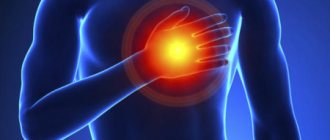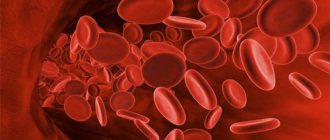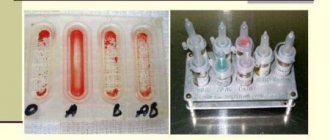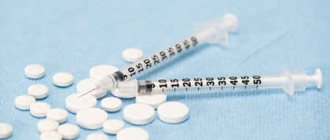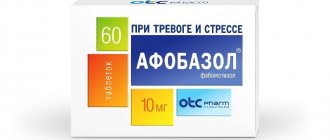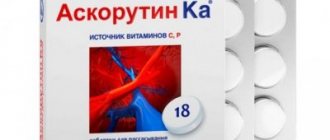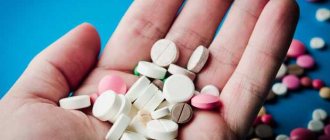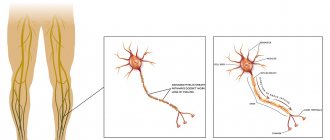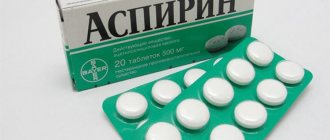Aspirin Cardio is a non-steroidal anti-inflammatory drug from the salicylates group, used as an inhibitor of platelet aggregation.
Acetylsalicylic acid, the active ingredient, has an antiplatelet effect when used for a long time in low doses.
The main mechanism of action of acetylsalicylic acid is non-selective inactivation of the COX enzyme, as a result of which the synthesis of prostaglandins, prostacyclins by endothelial cells (in doses of 300 mg) and thromboxane A2 in platelets is disrupted, which determines the antiplatelet effect of the drug, preventing the development of thromboembolism.
Aspirin Cardio may have other effects on the blood coagulation process, increasing fibrinolytic activity and reducing the concentration in the blood of vitamin K-dependent coagulation factors (II, VII, IX, X). Like other drugs of acetylsalicylic acid, it has anti-inflammatory, antipyretic, analgesic effects.
Absorption from the gastrointestinal tract occurs quickly and completely after oral administration, and depends on the dosage form of the drug. Thanks to the acid-resistant enteric coating, the active substance is not released in the stomach, but in the alkaline environment of the small intestine. Therefore, the absorption of acetylsalicylic acid in the enteric coating occurs 3-6 hours later compared to taking the usual form.
Effervescent aspirin tablets contain sodium bicarbonate, which neutralizes free hydrochloric acid to a pH of 6.0-7.0 in the stomach. This process reduces the irritant effect of the active ingredient on the mucous membranes of the gastrointestinal tract.
The half-life is from 20 minutes (the rate of secretion depends on the dose, and increases with increasing). Penetrates through the BBB into breast milk and is detected in synovial fluid.
Indications for use
What does Aspirin Cardio help with? According to the instructions, the drug is prescribed in the following cases:
- stable angina, unstable angina, including suspected cases of acute myocardial infarction;
- primary prevention of acute myocardial infarction (in the presence of risk factors such as hyperlipidemia, diabetes mellitus, arterial hypertension, old age, smoking, obesity), recurrent myocardial infarction;
- prevention of transient cerebrovascular accident;
- prevention of stroke, including patients with transient cerebrovascular accident;
- prevention of deep vein thrombosis;
- prevention of thromboembolism after coronary and arteriovenous bypass surgery, endarterectomy and angioplasty of the carotid arteries, angioplasty and stenting of the coronary arteries, other invasive interventions or vascular operations;
- prevention of thromboembolism of the pulmonary artery and its branches, including conditions of prolonged immobilization after major surgical operations.
Cardiac Aspirin
This is what enteric-soluble Aspirin Cardio is called in everyday life. Tablets are produced on the basis of acetylsalicylic acid and are used to treat various diseases. Initially, the medicine was used to reduce body temperature. Later, analgesic, anti-inflammatory, and blood-thinning properties were discovered. Cardiac Aspirin is available in salicylate concentrations of 50, 75, 100 or 300 mg. The drug is an anticoagulant (has an antithrombotic effect), an antiplatelet agent (thin the blood). The manufacturer of the tablets is the German company Bayer.
Composition and release form
This drug is available in white tablets, which are enteric-coated. A detailed list of tablet components is presented in the table:
| Item name | Concentration |
| Acetylsalicylic acid | 50/75/100/300 mg |
| Starch | 10 mg |
| Talc | 8 mg |
| Cellulose | 10 mg |
| Sodium lauryl sulfate | 57 mcg |
| Triethyl citrate | 0.8 mg |
| Polysorbate | up to 186 mcg |
Pharmacodynamics and pharmacokinetics
The acetylsalicylic acid contained in the drug suppresses the production of the enzyme cyclooxygenase, thereby eliminating inflammation and pain. In addition, cardiac aspirin provides the following effects:
- reduces the sensitivity of nerve endings;
- suppresses the development of prostaglandins, thereby reducing its effect on the thermoregulation center;
- has a depressing effect on thromboxane, which prevents an increase in blood pressure and the development of thrombosis.
After entering the gastrointestinal tract, the components of the tablet are partially converted into salicylic acid , a metabolite and metabolic product. Coated aspirin is released only in the duodenum, under the influence of an alkaline environment. Acetylsalicylic acid is completely absorbed into the blood. The enteric coating of the drug increases its absorption up to 6 hours. The medicine is completely excreted by the kidneys within 2-3 days.
Indications for use
This drug is used more to prevent cardiovascular disease than to treat it. Indications for taking cardiac Aspirin tablets are as follows:
- stable/unstable angina;
- prevention of myocardial infarction (in the presence of provoking factors: age, bad habits, diabetes);
- prevention of thrombosis, circulatory disorders in the brain, stroke;
- prevention of thromboembolism after surgery.
Instructions for use Aspirin Cardio 100\300 mg, dosage
The tablets are taken orally, 1 time per day before meals, with plenty of liquid. The drug is intended for long-term therapy; the duration of use is prescribed by the doctor individually, based on clinical indications.
Standard dosages of Aspirin Cardio according to the instructions for use:
- For unstable angina, for the prevention of thrombosis and embolism after vascular surgery, for the prevention of transient cerebrovascular accidents and stroke at the stage of clinical warning signs, the recommended dosage is 100–300 mg per day. For better tolerability of the drug, a dose of 100 mg per day is preferable.
- The optimal time to start therapy after coronary artery bypass grafting is 24 hours after the operation.
- For acute myocardial infarction, the recommended dose is 100–200 mg per day or 300 mg every other day.
- Prevention of transient cerebrovascular accident and stroke, thromboembolism after invasive interventions and vascular operations - 100–300 mg Aspirin Cardio daily;
- Prevention of deep vein thrombosis and thromboembolism of the pulmonary artery and its branches: 100-200 mg daily or 300 mg once every 2 days.
The maximum daily dose for adults is 1500 mg.
As a rule, the standard maintenance dosage for long-term use is 1 tablet of Aspirin Cardio 100 mg once a day.
Side effects
The instructions warn about the possibility of developing the following side effects when prescribing Aspirin Cardio:
- From the digestive system: nausea, vomiting, anorexia, epigastric pain, diarrhea; rarely - the occurrence of erosive and ulcerative lesions, bleeding from the gastrointestinal tract, impaired liver function.
- From the side of the central nervous system: with prolonged use, dizziness, headache, reversible visual impairment, tinnitus, and aseptic meningitis are possible.
- From the hematopoietic system: rarely – thrombocytopenia, anemia.
- From the blood coagulation system: rarely - hemorrhagic syndrome, prolongation of bleeding time.
- From the urinary system: rarely - renal dysfunction; with long-term use - acute renal failure, nephrotic syndrome.
- Allergic reactions: rarely - skin rash, Quincke's edema, bronchospasm, “aspirin triad” (a combination of bronchial asthma, recurrent polyposis of the nose and paranasal sinuses, intolerance to acetylsalicylic acid and pyrazolone-type drugs).
- Other: in some cases - Reye's syndrome; with long-term use - increased symptoms of chronic heart failure.
Contraindications
It is contraindicated to prescribe Aspirin Cardio in the following cases:
- bronchial asthma that occurs while taking salicylates and NSAIDs;
- aspirin triad (a combination of bronchial asthma, intolerance to ASA and recurrent polyposis of the nose and paranasal sinuses);
- hemorrhagic diathesis;
- severe form of renal failure (creatinine clearance less than 30 ml/min);
- acute period of erosive and ulcerative lesions of the gastrointestinal tract (GIT), gastrointestinal bleeding;
- chronic heart failure (III-IV functional class according to the NYHA classification);
- severe liver failure (Child-Pugh class B and higher);
- simultaneous use of methotrexate at a dose of 15 mg per week or higher;
- period of pregnancy (I and III trimesters) and breastfeeding;
- age under 18 years;
- hypersensitivity to NSAIDs, ASA and other components of the drug.
It is prohibited for use by women in the 1st and 3rd trimester of pregnancy, as well as children under 15 years of age who suffer from acute respiratory diseases caused by various viral infections - in this case there is a high risk of developing Reye's syndrome.
Prescribe with caution:
- People who have had gastrointestinal ulcers or gastrointestinal bleeding in the past;
- Patients with impaired liver and kidney function, bronchial asthma, polyposis of the nasal mucosa, hay fever or chronic respiratory diseases;
- In the second trimester of pregnancy;
- For allergic reactions to certain medications, including NSAIDs.
Overdose
In case of an overdose of moderate and mild severity, reactions such as the development of dizziness, hearing loss, headache, increased sweating, and confusion occur.
As a treatment, you should rinse the stomach, take activated charcoal repeatedly and restore the water-electrolyte balance. At the first symptoms of intoxication, you should immediately consult a doctor.
In case of a severe overdose, the patient experiences a significant increase in temperature, respiratory depression, cardiac arrhythmia, decreased blood pressure, development of gastrointestinal bleeding, tinnitus, drowsiness, convulsions, coma.
This condition requires immediate hospitalization for emergency care - gastric lavage, taking activated charcoal, and symptomatic treatment under medical supervision.
Directions for use and dosage
The tablets are taken orally, 1 time per day before meals, with plenty of liquid.
The drug is intended for long-term therapy; the duration of use is prescribed by the doctor individually, based on clinical indications.
Recommended dosage:
- stable and unstable angina, prevention of recurrent infarction: 100–300 mg;
- unstable angina in patients with suspected development of acute myocardial infarction: initial dose – 100–300 mg, the first tablet should be taken immediately after suspicion of acute myocardial infarction appears; it must be chewed for faster absorption. After the development of myocardial infarction: maintenance dose – 200-300 mg for 30 days. The patient should then be prescribed appropriate therapy to prevent recurrent myocardial infarction;
- primary prevention of acute myocardial infarction in patients with risk factors: 100 mg per day or 300 mg once every 2 days;
- prevention of transient cerebrovascular accident and stroke, thromboembolism after invasive interventions and vascular operations: 100–300 mg daily;
- prevention of deep vein thrombosis and thromboembolism of the pulmonary artery and its branches: 100-200 mg daily or 300 mg once every 2 days.
If you miss taking the next dose at the prescribed time, the tablet must be taken as soon as you remember, provided that this does not mean taking two doses at the same time.
Analogues of Aspirin Cardio, price in pharmacies
If necessary, you can replace Aspirin Cardio 100\300 mg with an analogue of the active substance - these are the following drugs:
- Aspicor,
- Aspirin,
- Express,
- Acecardo,
- Thrombo ACC,
- Cardiask,
- Thrombopol.
When choosing analogues, it is important to understand that the instructions for use of Aspirin Cardio, price and reviews do not apply to drugs with similar effects. It is important to consult a doctor and not change the drug yourself.
Price in Russian pharmacies: Aspirin Cardio tablets 100 mg 28 pcs. – from 125 to 140 rubles, 56 pieces – from 220 rubles, 300 mg tablets 20 pieces. – from 75 to 92 rubles, according to 829 pharmacies.
Store at temperatures up to 25 °C. Keep away from children. Shelf life – 5 years. Sale in pharmacies without a prescription.
According to reviews, “Heart Aspirin” is considered more accessible and easier to use than its substitutes. The most common side effects are stomach problems and dizziness. People often complain about the relatively high cost of the drug.
Cardiomagnyl and Aspirin Cardio - what is the difference, which is better?
Cardiomagnyl additionally contains magnesium hydroxide, which provides additional nutrition to the heart muscle. The drug is more suitable not for prevention, but for the treatment of various heart diseases, while Aspirin Cardio can be used for a long time (in low doses) for preventive purposes.
Pharmacological effect
The anti-aggregation effect is especially noticeable in platelets, because these formed elements do not “know how” to re-produce COX. Presumably, ASA can also involve other antiaggregation mechanisms, and this significantly expands the therapeutic capabilities of the drug. An interesting fact about the drug is that the severity of one of the directions of the triad depends on the dose of the drug taken by the patient:
- Small doses of the drug provide an antithrombic effect.
- In “shock” doses, the medicine works as an analgesic and anti-inflammatory agent.
To summarize the general information about the drug, it remains to say that Aspirin Cardio is an aspirin that disrupts the main mechanism of complications associated with thrombosis in cardiovascular pathologies:
- adhesion (sticking of formed elements to the vessel wall) of platelets;
- their aggregation (sticking together).
Aspirin is also interesting because, despite its short stay in the human body (the half-life of the active component is about 20 minutes), the effect of the drug as an antithrombotic lasts up to 2 days. For about a week, “residual traces of blood thinning” with acetylsalicylic acid are visible.
You can find out how Aspirin affects blood pressure by watching this video.
special instructions
The drug should be used only as prescribed by a doctor.
Risk factors for the development of hypersensitivity reactions, bronchospasm, and attacks of bronchial asthma during the use of Aspirin Cardio include chronic diseases of the respiratory system, hay fever, a history of bronchial asthma, nasal polyposis, urticaria, and allergic reactions in the form of skin itching to other drugs.
When carrying out planned surgical operations in patients taking the drug, one should take into account the persistence of the inhibitory effect of the drug on platelet aggregation for several days after the last dose. It is recommended to discontinue use in the preoperative period to prevent bleeding during and after surgery.
Exceeding the recommended dosage increases the risk of gastrointestinal bleeding, especially in elderly patients.
Use in patients with severe glucose-6-phosphate dehydrogenase deficiency may contribute to the occurrence of hemolysis and hemolytic anemia. The risk of developing these pathologies increases with high doses of the drug, fever, and acute infections.
Since low doses of Aspirin Cardio reduce the excretion of uric acid, in predisposed patients (with reduced excretion of uric acid), the drug may cause the development of gout.
Symptoms of occult bleeding include pallor, asthenia, and hypoperfusion.
Taking the drug does not affect the ability to drive vehicles and machinery.
Analogs
Synonyms for Aspirin Cardio are medications that have the same effect on the body, composition, and active component:
- Thrombo ACC - coated aspirin tablets, soluble in the intestines, produced by Lannacher (Austria) - from 138 rubles.
- Upsarin UPSA (Sanofi, Russian Federation, country of origin France) – effervescent tablets, from 180 rubles.
- Polocard (Polpharma S.A., Poland) – enteric tablets from 200 rub.
Analogues are distinguished by a similar mechanism of action to the original, but a different active ingredient or general composition:
- Cardiomagnyl (Denmark): ASA + magnesium hydroxide. More suitable for additional nutrition of the heart muscle with magnesium. The tablets do not have a shell, but magnesium hydroxide protects the mucous membrane from the negative effects of ASA. The cost is in the range of 153 – 365 rubles.
- Agrenox (Boehringer Ingelheim, Germany): capsules (ASA + dipyridamole), from 955 rub.
Before using analogues, consult your doctor.
